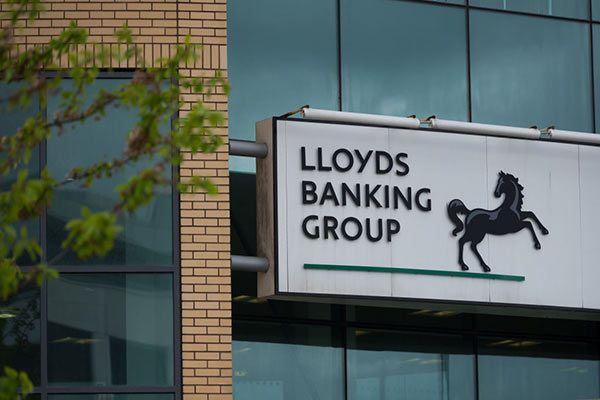Relief for Lloyds Bank and others after car finance decision
Investors had feared a repeat of the PPI scandal that cost the banking sector billions, which explains today’s share price rally. City writer Graeme Evans reports.
8th October 2025 15:32
by Graeme Evans from interactive investor

Relief that Lloyds Banking Group (LSE:LLOY) will avoid a PPI-type hit in relation to the mis-selling of car finance today helped its shares advance above 85p for the first in a decade.
The gradual easing of fears in relation to the potential cost of redress has helped the shares to advance by more than 55% this year, having lagged the performance of NatWest Group (LSE:NWG) in 2024.
- Invest with ii: Top UK Shares | Share Tips & Ideas | Cashback Offers
Shares today advanced 2.8p to 86.1p after the Financial Conduct Authority (FCA) estimated that its industry-wide scheme to compensate for the mis-selling of car finance between 2007 and 2024 could result in households getting an average £700 per claim.
That points to a total bill of about £8.2 billion, a fifth of the £38.3 billion received in the 2010s following the mis-selling of payment protection insurance (PPI).
The £2.8 billion cost of running the redress scheme leads to a base case scenario of £11 billion, which compares with the FCA’s previous guidance of between £9 billion and £18 billion. Some City estimates last year pointed to industry liabilities as high as £30 billion.
Lloyds, which has set aside £1.15 billion in relation to its exposure, issued a brief statement this morning telling investors it was assessing the FCA’s 360-page consultation document.
It is due to publish third-quarter results on 23 October, when the City will be looking for a steer on whether the lender needs to increase the provision or even reduce the amount.
- eyeQ: the only UK bank share that offers an edge
- New analyst ratings for FTSE 100 mining stocks
- US results preview: big upgrades for tech and finance stocks
Analysts at Jefferies said lenders looked to have landed in a better place than many feared in the early part of the summer, adding that this could lead Lloyds’ shareholders to consider scope for a larger share buyback than the City currently expects.
Lloyds announced a programme of up to £1.7 billion when it unveiled 2024 results in February.
Jefferies added: “The design of redress makes it hard to translate this to bank-specific figures, but we think it implies an approximate £1.5 billion cost for Lloyds (compared to our prior £1-2 billion range).
“Certain aspects may be challenged, though, so this might not be the final (360-page) chapter of the story.”
The consultation on the proposed redress scheme closes on 18 November, with the FCA due to announce its policy statement and final rules early next year.
FTSE 250-listed Close Brothers Group (LSE:CBG), which is another of the stocks exposed to the mis-selling of motor finance, rose 18.5p to 515.5p. It has more than doubled in value this year.
Shore Capital points out that the £2.5 billion improvement in the FCA’s central case still compares unfavourably to the about £2 billion of combined total provisions that it estimates the motor finance industry has set aside so far.
It adds that approximately 60% of motor finance loans written in the first half of 2024 related to the lending subsidiaries of vehicle manufacturers.
Shore said: “This suggests the non-banking industry will bear a large proportion of the bill, while also noting that little has been provided by these participants to date (unlike the banks which have been more proactive).”
- Insider: something fishy about this director deal
- Stockwatch: three shares trading at big discounts
- Sign up to our free newsletter for investment ideas, latest news and award-winning analysis
The outlook for car finance refunds worth £8.2 billion brings back memories of the payments households received in the 2010s in relation to the mis-selling of PPI, which lent some support to consumer spending.
Capital Economics said average PPI payments were the equivalent of 0.36% of nominal consumer spending per year between 2011 and 2019.
If the car finance refunds were all paid in 2026, then they would be equivalent to a bigger 0.43%, but the influence would be smaller if spread out over two years at 0.21% per year.
Capital Economics said: “Overall, our forecast is for real consumer spending growth to accelerate from around 0.9% this year to 1.5% in 2026 and to 1.8% in 2026.
“The car finance refunds to households won’t prompt us to raise those forecasts – it just reduces some of the possible drag should the chancellor raise taxes in the Budget.”
These articles are provided for information purposes only. Occasionally, an opinion about whether to buy or sell a specific investment may be provided by third parties. The content is not intended to be a personal recommendation to buy or sell any financial instrument or product, or to adopt any investment strategy as it is not provided based on an assessment of your investing knowledge and experience, your financial situation or your investment objectives. The value of your investments, and the income derived from them, may go down as well as up. You may not get back all the money that you invest. The investments referred to in this article may not be suitable for all investors, and if in doubt, an investor should seek advice from a qualified investment adviser.
Full performance can be found on the company or index summary page on the interactive investor website. Simply click on the company's or index name highlighted in the article.